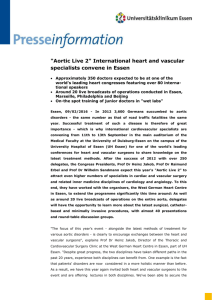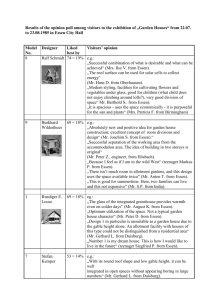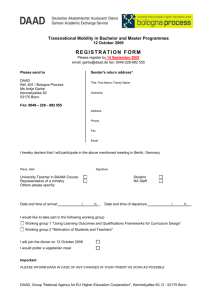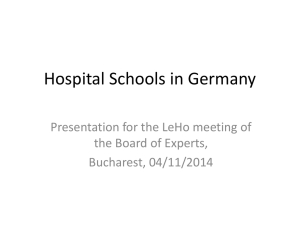Information of the course in Essen
advertisement
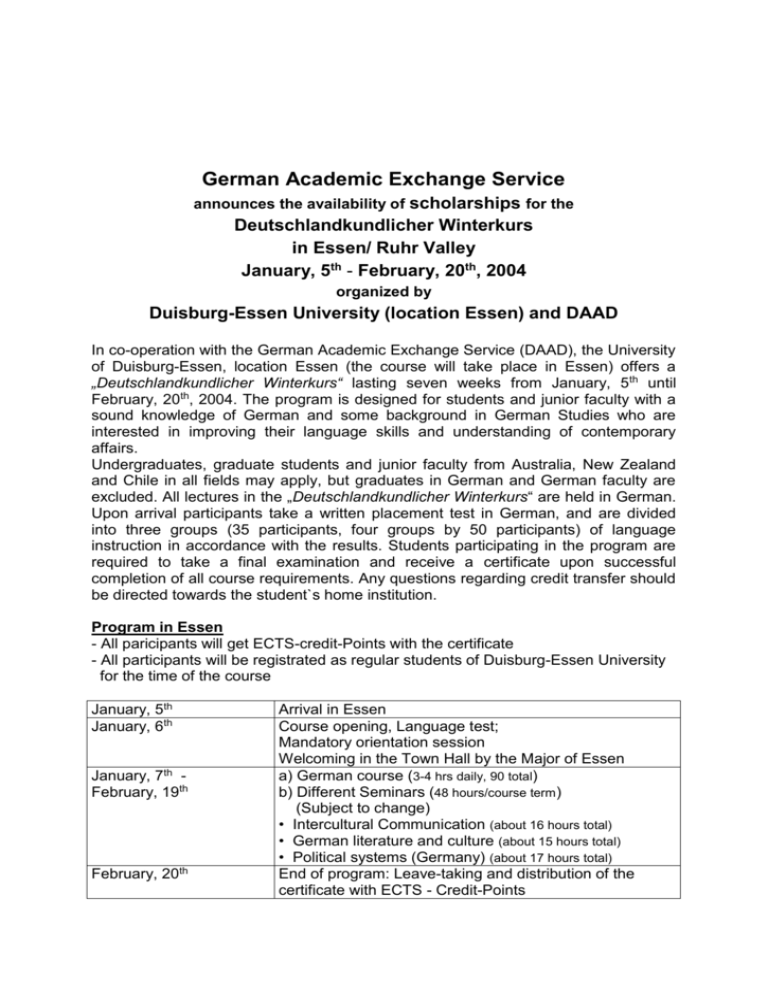
German Academic Exchange Service announces the availability of scholarships for the Deutschlandkundlicher Winterkurs in Essen/ Ruhr Valley January, 5th - February, 20th, 2004 organized by Duisburg-Essen University (location Essen) and DAAD In co-operation with the German Academic Exchange Service (DAAD), the University of Duisburg-Essen, location Essen (the course will take place in Essen) offers a „Deutschlandkundlicher Winterkurs“ lasting seven weeks from January, 5th until February, 20th, 2004. The program is designed for students and junior faculty with a sound knowledge of German and some background in German Studies who are interested in improving their language skills and understanding of contemporary affairs. Undergraduates, graduate students and junior faculty from Australia, New Zealand and Chile in all fields may apply, but graduates in German and German faculty are excluded. All lectures in the „Deutschlandkundlicher Winterkurs“ are held in German. Upon arrival participants take a written placement test in German, and are divided into three groups (35 participants, four groups by 50 participants) of language instruction in accordance with the results. Students participating in the program are required to take a final examination and receive a certificate upon successful completion of all course requirements. Any questions regarding credit transfer should be directed towards the student`s home institution. Program in Essen - All paricipants will get ECTS-credit-Points with the certificate - All participants will be registrated as regular students of Duisburg-Essen University for the time of the course January, 5th January, 6th January, 7th February, 19th February, 20th Arrival in Essen Course opening, Language test; Mandatory orientation session Welcoming in the Town Hall by the Major of Essen a) German course (3-4 hrs daily, 90 total) b) Different Seminars (48 hours/course term) (Subject to change) • Intercultural Communication (about 16 hours total) • German literature and culture (about 15 hours total) • Political systems (Germany) (about 17 hours total) End of program: Leave-taking and distribution of the certificate with ECTS - Credit-Points The city and its region The City of Essen is one of the biggest cities in the Federal Republic of Germany with a population of more than 600 000. In the past a leader in the coal mining and steel industries, nowadays the city is an important trade and administration centre with excellent recreational facilities. The city of Essen has a multifaceted cultural programme. In 1982, Germany’s most modern opera house opened here. In 1972 the university was founded in Essen close to the city centre. With its almost 25 000 students the university has a significant impact on the cultural life of the city. The Ruhr Valley is one of the most densely populated city areas in the world. The numerous cities are inter-connected and together form an internationally important economic centre. The Ruhrvalley is unrivalled in terms of its many theatres, museums, educational and recreational facilities. In short, the Ruhr Valley is a cultural area with Essen as an important centre. In the Rhine Ruhr Region other significant centres do exist: the trade centre Düsseldorf, with its international airport, the old city of Cologne close the Rhine with its famous cathedral and Bonn, the former place of parliament for the Federal Republic; all these cities are not far away from Essen and easily to be reached by bus and train. The courses in Essen offers students a good opportunity of different aspects of this interesting part of Germany. Lessons 1. Language teaching (90 hours total) The course offers intensive language teaching, on different levels. Professional teachers will give the language lessons. The teachers are qualified in traditional method as well as in modern teaching methods. The language classes are specially adjusted to the needs and the knowledge of the participants in each class. In addition it is possible for the participants of each class to decide together with the teacher upon the teaching curriculum so there will be individual language-teaching with best efficiency. In addition special subjects/ topics will be trained, so that it is possible to help with individual problems in the language learning process. Subject/ topic of the lessons for example: grammar text production reading comprehension audio comprehension vocabulary specially idioms, idiomatic expressions communication pronunciation writing In addition depending from the class for example: correspondence for example business letters and the special vocabulary new German orthography different variants of the language (colloquial German, dialects etc.) 2. Working groups and seminars (48 hours total) (subject to change): Intercultural Communication, (about 16 lessons) Political systems (Germany), (about 17 lessons) German literature and culture, (about 15 lessons) 3. Besides the participants and tutors will write a course-journal up. Participants are expected to attend all scheduled classes and activities regularly, and to invest a significant amount of time in homework and class preparation. The „Winterkurs“ will also include city tours and excursions, as well as visits to museums and other cultural institutions. Extra curricular course activities Subject to change Most free of charge A) Trip to Berlin: January, 26th to February, 1st Attendance of the Berlin trip is mandatory! Transport to and in Berlin and Potsdam, tours, guidances, hotel and breakfast free of charge! For example: a) Different guided tours in Berlin b) Reichstag, Bundestag c) We try to get a guided tour at Schloss Bellevue d) Day - trip to Potsdam: - guided tour Schloss Sanssouci - guided tour Cecilienhof B) During the week after the lessons or in the evening, some Saturdays and Sundays the tutors will offer different activities. After arriving in Essen you will get a program, so that you are able to decide: For example: 1) Essen and its surroundings (Ruhr Valley) a) Guided city tour in Essen, free of charge (approx. 2 hours) b) Attractions in Essen, for example: The Museum Ruhrland: geology, industrial and sociological history of the region and the Museum Folkwang: oldest collections of art to the 19th and 20th century, the Old Synagogue, a monument as well as a centre for historical and political documentation since 1980 and Villa Hügel, etc. c) Trips to cities close to Essen, for example: an old town Hattingen, Oberhausen with it modern shopping centre, the Gasometer with a height of 117 metres, a famous museum with varying exhibitions and the castle. d) Pub evenings: Essen offers a lot of different pubs. If you want, you will get to know some of them and have a nice evening with participants and tutors. e) Movies (cinema) f) One opera or ballet, free of charge g) Party 2) Rhine - Region a) Cologne: Transport, guided city-tour and cathedral (Kölner Dom) free of charge b) Bonn: We will go for a visit of the German Academic Exchange Service (DAAD) and the Museum of History of the Federal Republic of Germany (BRD), free of charge c) Düsseldorf: We will offer a trip to the Capital of North Rhine-Westphalia, free of charge 3) Dreiländer-Bustour (guided day-trip) with stops in a) Maastricht (dutch city of art and culture, with guided city-tour) b) Abbey of Val Dieu/Belgium close to Aubel c) Vaals (Netherlands; the point where Germany, Belgium, and the Netherlands meet) Status at Duisburg-Essen University From January, 5th to February, 24th you will be student of Duisburg-Essen University. Included in the student card of Duisburg-Essen University is a ticket for public transport (January, 5th to February, 24th ) in Essen and surrounding cities (Ruhrarea: for example to Düsseldorf, Oberhausen, Dortmund, Duisburg, Hattingen, Gelsenkirchen etc.). With the student card you have to pay student prices only (for example in a museum). The registration will cost you about EUR 45,-- for the whole time. Accommodation and Catering Participants, who are interested in renting a room, will stay in single-rooms at a student hostel. We try that all participants will stay in the same hostel. The hostels are international and about 10 km from University, rent about EUR 210,-- for January and EUR 210,-- for February. Students will have access to kitchens, toilets and showers; bed linen, a pillow and some kitchenware will be in the rooms. There are no towels and no coat hangers! During the week you are able to buy lunches in the canteen and snacks in the cafeteria at a reasonable student price. The rooms are available from: January, 5th (12 o’clock noon) – February, 24t (12 o’clock noon) Costs/scholarships Participation in the winter course is limited to DAAD-scholarship holders. A group of students from Brazil will also participate in this course. DAAD will offer approximately 35 scholarships covering tuition and fee for the course and including a stipend of EUR 1800,--. These funds will be transferred directly to the University of DuisburgEssen (location Essen) to be paid out in cash by arrival (Jan., 5 th ) and at the beginning of February (Feb., 2nd) to participants. The stipend of EUR 1800,-comprises a travel subsidy of EUR 770,-- and a subsidy of EUR 1030,-- for living expenses. In addition participants should plan EUR 250,-- to EUR 300,-- of their own funds for additional expenses. Students must arrange and pay for transportation to Essen (airport: Düsseldorf; train from Düsseldorf to Essen (max. 30 minutes). You will get detailed information about that later. Health insurance will be provided by DAAD. Eligibility requirements Applicants must: be holders of an Australian, New Zealand or Chilean passport; be at least 19 years of age, but not older than 32 (by January 2004); be currently inscribed at a University in Australia, New Zealand or Chile; be at least in their second year of college level education at the time of application; i.e. by August 2003; have an academic record better than B average; have completed at least two years of college level German by January 2004. Application procedure Application forms may be obtained from: Heads of Departments of German at Universities in Australia, New Zealand and Chile or DAAD-IC (Centro de Información) at Goethe-Institut Santiago (E-mail: daad@entelchile.net), Dr. Anne Sperschneider or the German Embassies in Canberra, Wellington and Santiago and the German General Consulates in the three countries or Deutscher Akademischer Austauschdienst (DAAD), Referat 324, Kennedyallee 50, D- 53175 Bonn, Federal Republic of Germany. Telefax: (0228) 882 627; E-mail: sprachkurse-auslaender@daad.de Completed applications must be returned directly to the DAAD in Bonn at the above address and received by August 15th , 2003 at the latest. Applicants will be notified on the results of their application by September 2003. Information of the course in Essen Universität Duisburg-Essen, Standort Essen Frau Ramona Karatas, FB 3 Universitätsstraße 12 D - 45117 Essen Tel:/Fax/Answering Machine: D- (0) 201 183-3371 E-Mail: ramona.karatas@uni-essen.de

